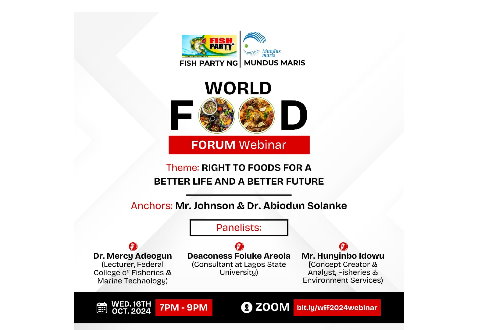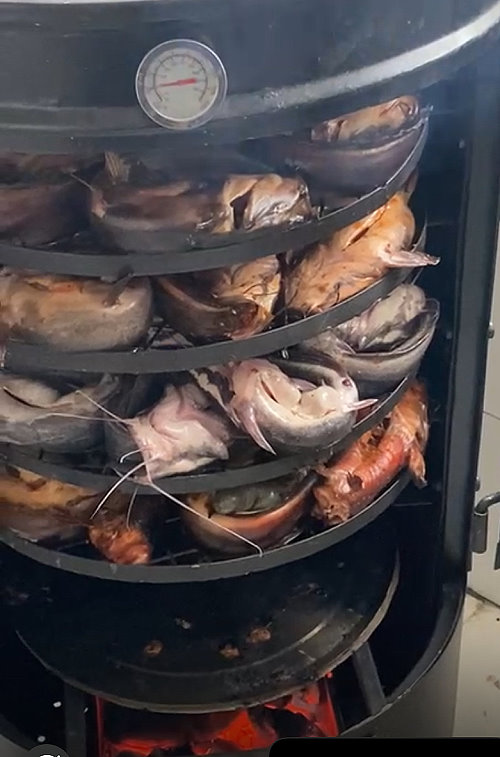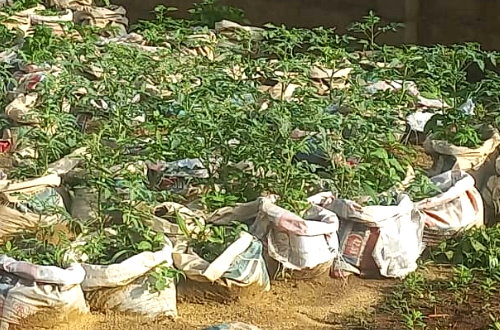 On World Food Day 2024, 16 October, Mundus maris hosted an impactful virtual webinar in collaboration with Fish Party, focusing on food security challenges and solutions with insights from Ghana and Nigeria. Dr. Ayojesutomi Abiodun-Solanke, opening the event, highlighted the urgency of addressing hunger exacerbated by recent global crises.
On World Food Day 2024, 16 October, Mundus maris hosted an impactful virtual webinar in collaboration with Fish Party, focusing on food security challenges and solutions with insights from Ghana and Nigeria. Dr. Ayojesutomi Abiodun-Solanke, opening the event, highlighted the urgency of addressing hunger exacerbated by recent global crises.
Dr. Cornelia E. Nauen, President of Mundus maris, emphasized the need for comprehensive policy reforms and local innovation to combat food insecurity, as outlined in the latest SOFI report about the State of Food Security and Nutrition in 2024. This flagship report was issued by FAO, IFAD, World Food Programme, UNICEF and WHO. Moderated by Johnson Adebukola, the webinar featured prominent panelists, including Dr. Mercy Adeogun, Deaconess Foluke Omotayo Areola, and Mr. Idowu Hunyinbo.
 Discussions underscored essential themes for sustainable food systems, starting with support for small-scale farmers. Dr. Adeogun highlighted the need for targeted government support to mitigate post-harvest losses through access to loans and infrastructure like refrigeration.
Discussions underscored essential themes for sustainable food systems, starting with support for small-scale farmers. Dr. Adeogun highlighted the need for targeted government support to mitigate post-harvest losses through access to loans and infrastructure like refrigeration.
Deaconess Areola called for holistic policies to reduce food loss and waste, emphasizing better infrastructure, educational initiatives, and targeted support for vulnerable groups to achieve SDG2. Mr. Hunyinbo advocated for improved preservation methods like smoking and solar drying, which could make fish more accessible in low-income and remote areas.
The role of education emerged as a vital factor, with Mr. Hunyinbo urging food literacy from early school years and structured campaigns on sustainable, nutritious diets. Dr. Adeogun noted that urban farming and alternative farming techniques could meet the rising demand for organic, chemical-free food, although organic farming practices need increased awareness and support.
 To address climate resilience, Deaconess Areola discussed the importance of conservation agriculture, early warning systems, and the adoption of adaptive crop and fish varieties. Policies should prioritize small pelagic fish to improve nutrition affordably, while equitable access for marginalized groups must remain central to policy discussions.
To address climate resilience, Deaconess Areola discussed the importance of conservation agriculture, early warning systems, and the adoption of adaptive crop and fish varieties. Policies should prioritize small pelagic fish to improve nutrition affordably, while equitable access for marginalized groups must remain central to policy discussions.
Concluding on a hopeful note, Mr. Hunyinbo emphasized empowering women in fisheries, calling for more training, networking, and leadership roles to drive inclusive growth. Dr. Solanke thanked all participants for their invaluable contributions and reiterated Mundus maris’ commitment to fostering sustainable, collaborative approaches to food security.
This webinar served as a testament to the power of knowledge exchange, highlighting that while challenges persist, strategic collaboration and local empowerment are key to achieving food security in West Africa and beyond.
Text and photos by Dr. Ayojesutomi Abiodun-Solanke.
Il mare ci nutre
- World Food Day 2024, Joint Webinar with Fish Party
- Relatore Speciale delle Nazioni Unite sul diritto al cibo
- EP Hearing on EU Citizen Initiative to stop shark finning
- Keynote at the ‘Feed the Future – Innovation Lab for Fish’
- FAO webinar ‘Pesce piccolo a basso prezzo: dall’esca al piatto’, 15-16/02/2021
- Pesce e frutti di mare deliziosi e sostenibili ai workshop di Mundus maris
- Chiloé, ossia: il disastro di Salmonopoli
- Seafood Symposium – Dalla pesca ai buongustai, 27 Aprile 2015
- Baltic students concerned about sustainable foods, Rogow, Poland, 15-19 April 2015
- Dai piatti al carburante – il controverso boom delle alghe in Cile
- Khazan – Traditional coastal zone management in Goa, India
- Comportamento del consumatori attento all’ambiente nel settore alimentare: cosa posso fare?
- Save baby fish or Point ‘n’ kill?
- “Inseparable” – La campagna sulla sostenibilità del pesce celebra un evento ad Atene
- Respect for minimum fish size. What do Senegalese fish mongers have to say?
- La campagna di Mundus maris nei mercati di Dakar
- Salviamo gli Oceani! – Cercle Europa esorta
- International Study Group Brussels: Save the Seas!
- Mercado San Miguel in Central Madrid
